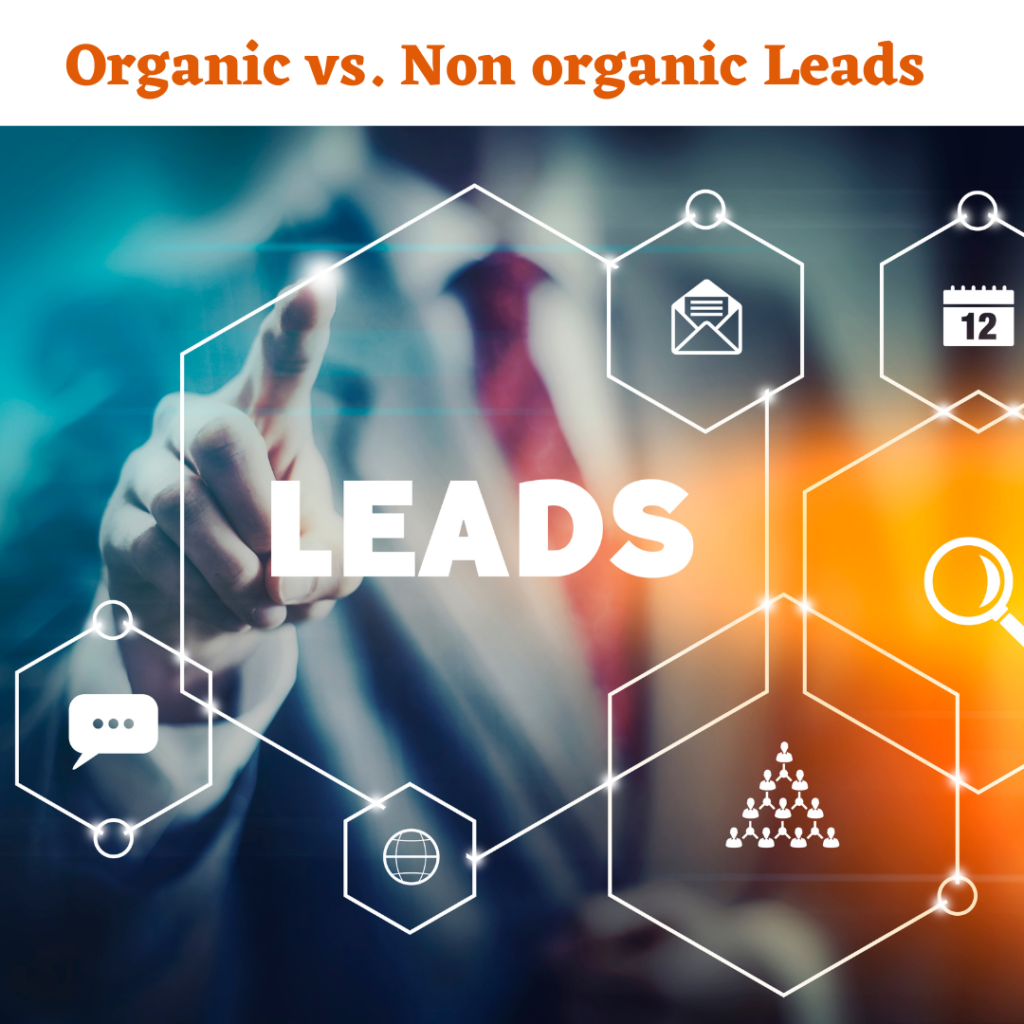Lead generation is an important part of any marketing strategy. The point is that many people are unaware of what lead is. Let’s discuss the organic vs Non organic leads.

What are organic Leads?
We use the terms “organic” and “natural” frequently. However, the reality is that they are very different. The phrase “organic” refers to something that has grown naturally. For example, we produce organic food without using chemicals, pesticides, fertilizers, or antibiotics to grow or raise crops.
When anything in life happens organically, it means that it is not forced. This means that there is no money involved in digital marketing. Customers are not “forced” to consume organic content by appearing on the websites they visit or in their Facebook News Feed; They should be looking for it while browsing.
Your company can generate leads naturally by creating content that is attractive to your ideal target market. Whether you engage in marketing emails, social media sharing, or SEO-optimized blogs, focus on generating useful, informative material that fulfills the needs of potential consumers at each stage of their journey – since not everyone is ready to purchase.
Advantages of organic leads
Organic marketing is the best option if your long-term business and personal goals align. This will provide you with a competitive advantage over your competitors as well as the following advantages:
- A cost-effective marketing strategy for your product or service
- It helps develop a real audience who would love to do business with you.
- Enables you to establish strong domain authority.
What are Inorganic leads?
Organic marketing is the opposite of inorganic marketing because it costs money. This includes paying for advertising on digital platforms to display your ads when users visit those sites.
While this gives you more visibility and opportunities to generate new leads for your business, it is only for a short period. When your advertising money runs out, so does your product/visibility of service.
Advantages of inorganic :
Inorganic marketing is the best option if your product or service is only available for a limited time or if you need to expand your business quickly.
- It helps you reach a specific group of people you wish to reach.
2. It is extremely successful in generating sales-ready leads for your company.
3. It can give you results in a short amount of time.
What’s the Difference Between Inorganic and Organic Leads?
Organic and inorganic are generally natural and artificial respectively. When someone types a phrase into the search engine, they are provided with a set of results pages. The order in which these results appear underscores the goal of any content strategist: search engine optimization (SEO).
Without paying for advertising, organic leads will lead to your company’s website in search results. High exposure, rank and a natural increase in organic links result from a good SEO strategy.
An SEO strategy’s main purpose is to create leads. This is fulfilled by ensuring that your company’s website has a high level of exposure and ranking. When someone searches for a keyword connected to your business, you want your company’s website to come up first in the search results.
Search engines like Google and Bing, social networking sites like Facebook, Instagram and LinkedIn, and email are examples.
On the other hand, inorganic leads are on the opposite end of organic leads. These are the result of sponsored advertising rather than a well-executed SEO plan.
In other words, paying for ads artificially increases the position and performance of your website. When a user does a keyword search, the top of the page displays results with a sponsored ad link. On the other hand, if you choose Sponsored Ads, your website will be given a main position for a short period.
Your website will lose rank once you spend your advertising money, regardless of the SEO technique (or lack thereof) you use. Perhaps a hybrid marketing strategy combining SEO and paid advertising works better for the leading company.
Conclusion:
In this blog we have understood the Organic vs. Non organic leads. Both organic and inorganic marketing tactics have benefits. Organic marketing has an advantage based on quality attributes and long term sustainability. Paid inorganic marketing services are the only option when a company is new or requires immediate results, such as a large reach in a short amount of time.
However, if a firm is serious about achieving its digital marketing objectives, it should refrain from taking any route. It requires a combination of organic and inorganic digital marketing. A clever mix of these two strategies will get you there.
